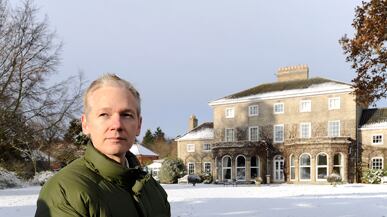Among the circus of celebrities, lawyers, and journalists gathering around Julian Assange, one eccentric stands out: his British patron.
When it looked like the WikiLeaks' founder might never escape his cell in London's Wandsworth Prison, it was Vaughan Smith who gave Assange sanctuary at his 18th-century manor house set on 600 acres of beautiful countryside, 130 miles northeast of the capital.
Swedish authorities are seeking the extradition of Assange, so that he might stand trial in Sweden on charges of sexual assault. Last week, the British High Court in London released Assange on a $316,000 bail on the condition that he hand over his passport and wear an electronic bracelet to track his movements.

Smith, a former captain in the elite Grenadier Guards, was crucial in securing bail for Assange, who will spend Christmas under effective house arrest at Ellingham Hall, which has been in Smith's family for 225 years.
Smith, 47, freely admits it will be "one of the most unusual Christmases ever" for him, Kosovan-born wife Pranvera Shema, and their two daughters. That's saying something coming from a man for whom the word "maverick" could have been invented.
When Assange first came to Britain, it was Smith who gave him refuge in an apartment at the Frontline Club—the west London venue that Smith set up in 2003 to champion independent journalism. The popular club in Paddington fast became a favorite watering hole for war correspondents.
Smith named the place as a tribute to his comrades from his days as an award-winning cameraman during the 1990s in the war zones of Iraq, Afghanistan, Bosnia, Chechnya, and Kosovo.
It was that work which spurred him to create Frontline Television News, an agency set up to represent young journalists who wanted to push the boundaries of their profession. Their work was so dangerous that nine members or ex-members of Frontline were killed doing the job they loved.
Smith's adventures and the agency's history are chronicled in David Loyn's book Frontline: The True Story of the British Mavericks who Changed the Face of War Reporting.
Although clearly a big admirer of Assange, Smith remains an astute businessman: Assange and his team are apparently expected to pay for their food and board during their stay.
Veteran BBC correspondent Loyn, who has known Smith for almost 20 years and worked with him in Kosovo, Afghanistan, and Iraq, said Assange and Smith met "relatively recently" when Assange used the club as his London base.
The BBC correspondent says Smith is "intrigued by Julian and his work" and outraged by the way Assange has been treated.
"Vaughan has an old-fashioned sense of libertarian values. He supports Julian's commitment and courage, even though he doesn't necessarily support all the leaks, and wanted to help," said Loyn. "Vaughan is an idealistic man who established the Frontline Club because he strongly believed in it—despite the huge financial risk."
During his days as a cameraman, the risks were even greater. Smith was shot twice, leading him to joke he had "been shot more times than he had been credited by the BBC."
He filmed the only uncontrolled footage of the Gulf War in 1991 after he bluffed his way into an active service unit disguised as a British Army officer.
On their dangerous trips together, the BBC veteran remembers Smith as "tough, very resilient and single-minded" as they trekked though Afghanistan living on boiled lentils cooked by Loyn.
But there was more to Smith than just his physical toughness. He was one of the first cameramen to edit his work on a laptop in the field before transmitting it back home. Loyn explains: "He had cutting-edge skills and always like to push the boundaries."
It is that same ferocious determination in Assange to push the boundaries which Smith so admires and why he finds the "professorial" WikiLeaks' founder "fascinating" company, according to Smith's friends.
The pair has now transferred the venue for their animated conversations from the club to the circular dining table at Ellingham Hall in Suffolk where Smith's organic farm provides the food for his club.
The 10-bedroom manor house has its own staff and a well-stocked wine cellar. It is also close to the local police station which Assange was told to visit regularly as part of his bail conditions ahead of a potential trial in Sweden on sexual assault charges—charges Assange fiercely denies.
The grounds of the grand estate are home to pheasants, which provide sport for the shooting enthusiasts who pay to stay at Ellingham.
Although clearly a big admirer of Assange, Smith remains an astute businessman: Assange and his team are apparently expected to pay for their food and board during their stay.
The request is perhaps unsurprising for a man who now runs a $4-million business and employs around 40 people.
Earlier this week, Smith told BBC Radio that he would "never abandon Julian." That pledge will be now put to the test as legal authorities step up their battle to extradite the WikiLeaks' founder.
In the meantime, Smith and Assange will be joined by friends and family over Christmas at Ellingham which, for now, acts as Assange's home and sanctuary as well as his campaign center and luxurious "prison."
Vincent Moss is the Political Editor of the Sunday Mirror newspaper.




